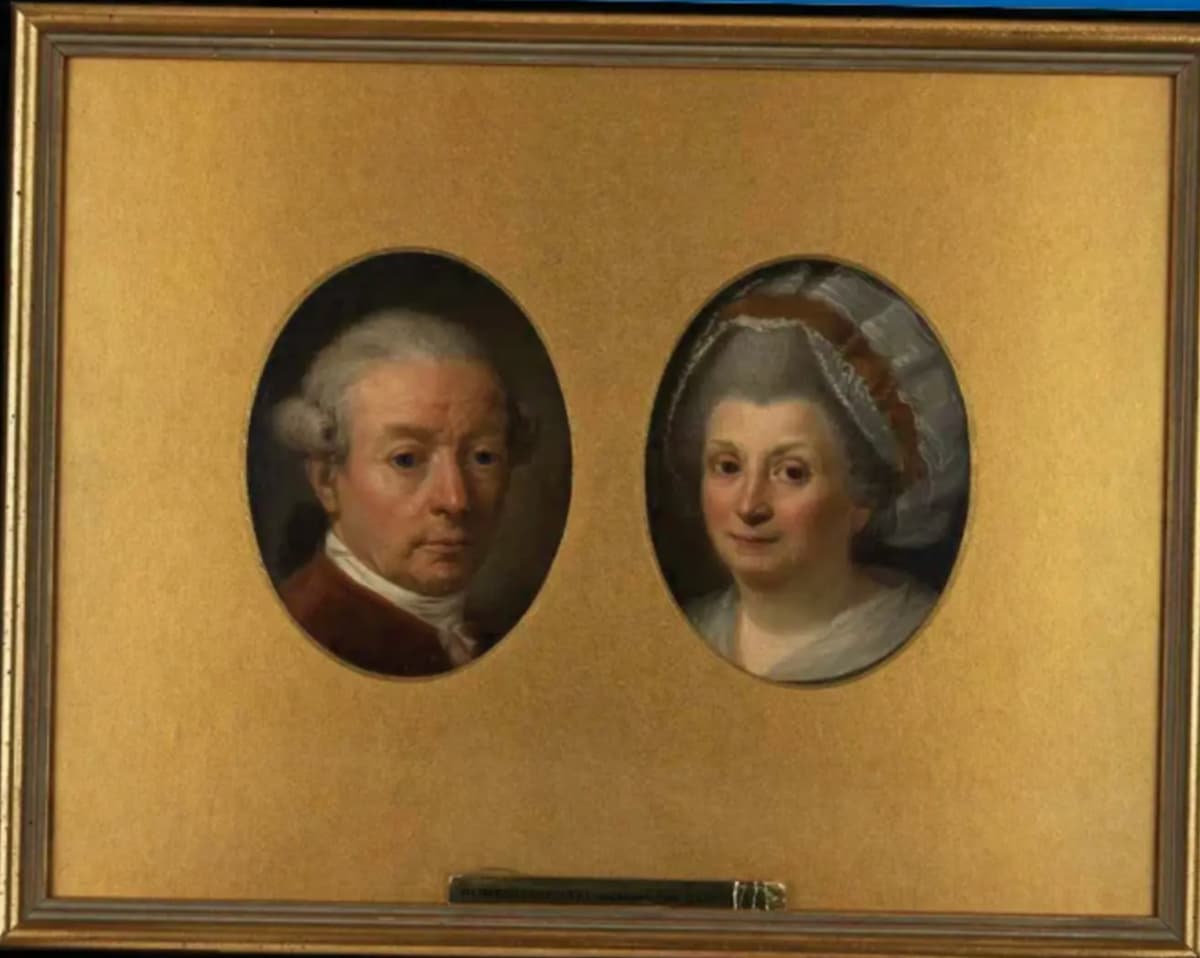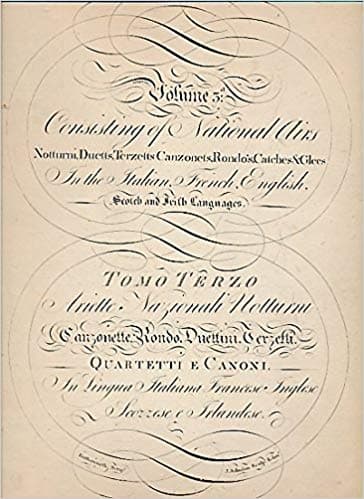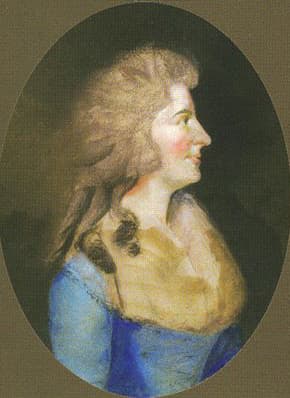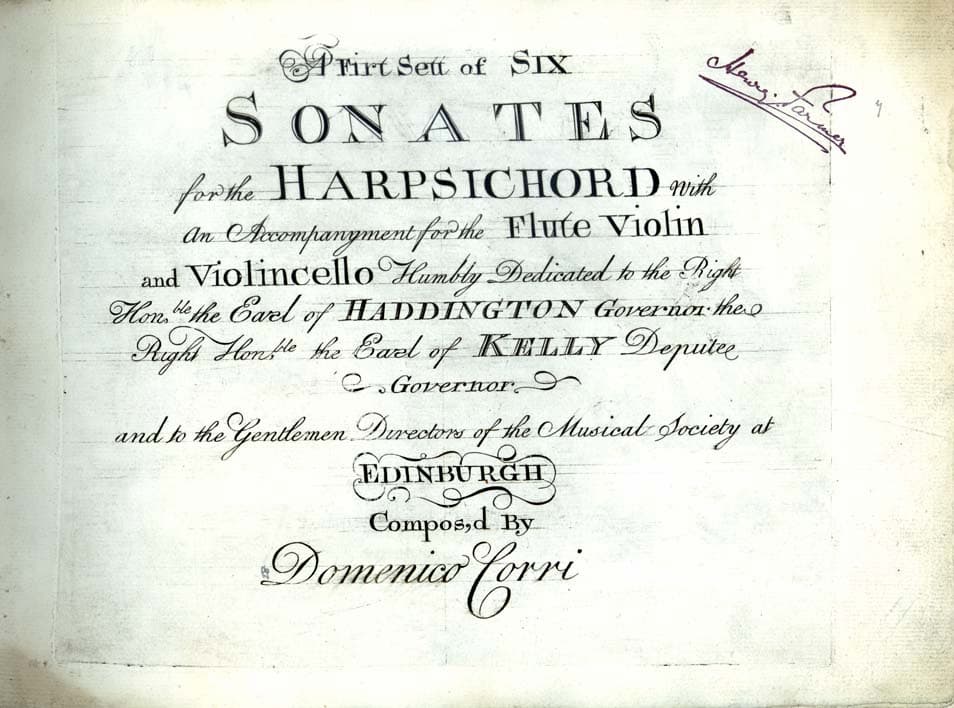The Italian composer, impresario, music publisher and voice teacher Domenico Corri (1746-1825) was a towering and eventually insane figure in the music industry of the British Isles of the late 18th century. Born in Rome, he became a student of Muzio Clementi and was primed for priesthood. In the event, his family sent him to Naples for vocal studies with the great Nicolo Porpora instead. Porpora had himself been a student of Scarlatti and the renowned teacher of Mingotti and Farinelli.

Domenico Corri with his wife Sophia Bacchelli © pressreader.com

Publication by Domenico Corri
Corri remained with Porpora for the better part of five years and only returned to Rome after his master’s death. He conducted concerts of the Roman and expatriate English nobility, and his opera La raminga fedele was produced in 1770. Charles Burney met Corri in Rome, and thought him “an ingenious composer who also sings in very good taste.”
Domenico Corri: Sonata Quinta, “Allegretto”
Corri and his wife, the soprano Signorina Baccelli, also made the acquaintance of Prince Charles Edward Stuart and his brother Cardinal York. The result was an invitation from the Musical Society of Edinburgh to conduct concerts at St. Cecilia’s Hall, with Corri’s wife engaged on a singing contract. They arrived in August 1771 on a three-year contract but remained for the better part of 18 years. Corri quickly established a number of business enterprises and became the manager of the Vauxhall Pleasure Gardens and the Theatre Royal in Edinburgh. Both enterprises were marked by financial difficulties, and Corri decided to get into publishing with his brother Natale. He engaged James Sutherland as a partner, and the firm Corri &Sutherland published “A Select Collection of Forty Scotch Songs, with introductory and concluding symphonies.” That fashionable album of harmonized Scot songs included settings by Haydn and Dussek, and also a reworking by Natale Corri.
Franz Joseph Haydn: Old highland laddie, Hob.XXXIa:248 (Jamie MacDougall, tenor; Haydn Trio Eisenstadt)
Franz Joseph Haydn: O’er the hills and far away, Hob.XXXIa:149bis (Lorna Anderson, soprano; Jamie MacDougall, tenor; Haydn Trio Eisenstadt)

Sophia Dussek
When James Sutherland died in 1790, Corri moved to London and established himself as a music publisher in Soho. His company issued single numbers from opera and solo songs, many published serially under general titles and decorated with the Prince of Wales’s feathers. All publications were dedicated to the queen, and they contained “the first examples published in England of accompaniments fully written out instead of being left to the player to fill in from the figured bass.” Corri’s publishing business received a huge boost when his daughter Sophia Giustina Corri married the pianist and composer Jan Ladislav Dussek in 1792. Dussek went into partnership with his father-in-law, printing music and acting as the agent for Broadwood pianos in Scotland. Even the great author and poet Lorenzo da Ponte was associated with the firm, but since nobody had any business experience or common sense, the company soon ran into severe financial trouble. Dussek was forced to flee to the Continent to avoid his creditors, but Corri’s home continued to be a favorite venue for private musical soirées, attended by the most eminent professors of the metropolis.”
Jan Ladislav Dussek: Piano Concerto in G minor, Op. 49 (Andreas Staier, piano; Concerto Köln)

Domenico Corri’s 6 Sonatas
With his publishing business on the back foot, Corri turned once again to composition. On 22 January 1806, he produced a five-act opera titled “The Travellers, or Music’s Fascination.” The acts of the opera played successively in Beijing, Constantinople, Naples, Caserta and Portsmouth. In the preface, Corri explained that the work described the “styles of the four quarters of the world.” Although the production gained notoriety for its exotic subject, it failed miserably. Never at a loss for new ideas, Corri started writing his autobiography, which he eventually published under the title The Singer’s Preceptor in 1810. And of course, he continued to organize concerts in London. A noteworthy event was held in the Argyll Rooms in Regent Street, the favorite concert hall in London at this time. Corri put together a rather colorful program featuring Pergolesi’s Stabat Mater contrasted by light ballroom music. Eventually, his health started to decline around 1820, and he was subject to bouts of insanity during the last years of his life. Corri died in London at the age of 78.
For more of the best in classical music, sign up for our E-Newsletter
